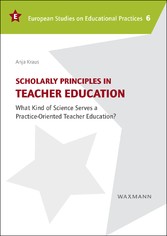Suchen und Finden
Service
Mehr zum Inhalt

Scholarly Principles in Teacher Education - What Kind of Science Serves a Practice-Oriented Teacher Education?
Contents
5
Introduction
7
1. Current Controversies on Teacher Education
11
1.1 The Aims of the Council of the European Union
11
1.2 Current Controversies about Teacher Education and its Historical Background
12
1.3 The Relation of Theory and Practice in Professional Teaching and its Relation to Scientific Approaches
32
2. The Challenge of a Relation of the General and the Particular in Scientific Thinking and Research
54
2.1 The Phenomenological Noematic and the Noetic Concept of Science as a Basis for Modeling Teacher Education
60
2.2 On the Noematic Concept of Science
63
2.2.1 Criticism of Noematic Models of Teacher Education
65
2.2.1.1 Teacher Education as a Development of “Competences”
66
2.2.1.2 Standards, Standardized Teaching and Teacher Education
69
2.2.1.3 Teacher Education as a Development of “Subjective Theories” and the Concept of “Reflective Practitioning”
71
2.2.1.4 Criticism of the Noematic Concept of Science in Education and Outlook on the Phenomenological Noetic Alternative
73
2.3 On the Phenomenological Noetic Concept of Science
81
2.3.1 Knowledge Forms and Knowledge Formats
85
2.3.2 “Epistemology”
87
3. Science from the Phenomenological Noetic Perspective
89
3.1 On Phenomenological Epistemology
91
3.1.1 Body-Phenomenology and the Concept of a “Constitutive Corporality”
92
3.1.2 On Body-Phenomenological Epistemology
95
3.2 On Performativity-Oriented Epistemology
98
3.3 On Praxeological Epistemology
107
4. The Epistemology of Science-Oriented Teacher Education and Empirical Approaches to Orientative and Practical Knowledge of Teachers
110
References
122
Alle Preise verstehen sich inklusive der gesetzlichen MwSt.









